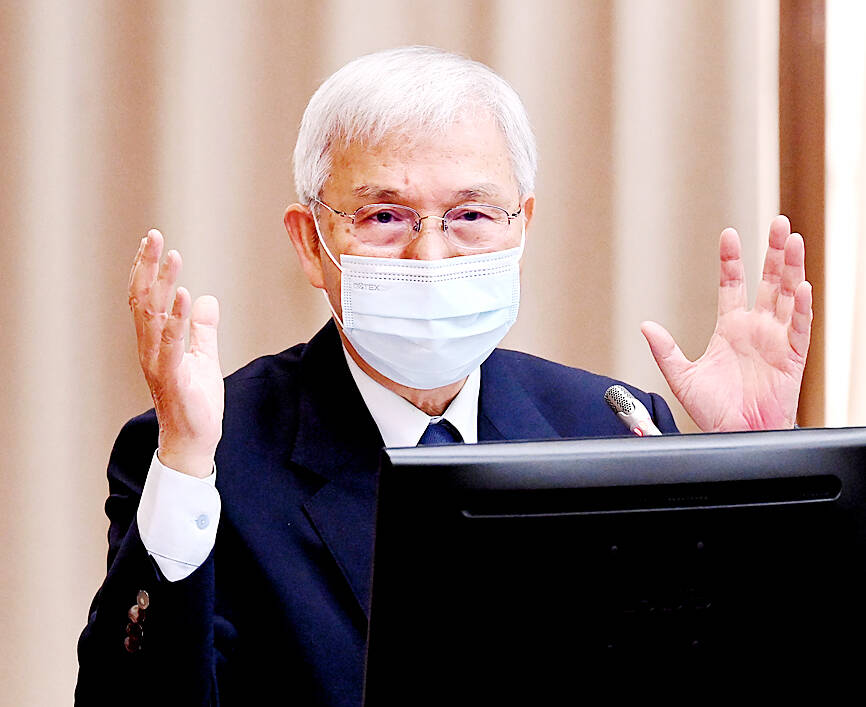The central bank would cautiously deal with the inflation issue next week in a quarterly policymaking meeting, as expected electricity rate hikes are feeding inflation fears, bank Governor Yang Chin-long (楊金龍) said yesterday.
“The board of directors will approach the issue very carefully when they meet and review policy rates on Thursday next week,” Yang told a meeting of the legislature’s Finance Committee in Taipei.
If the inflationary gauge persistently stays above the 2 percent alert, the era of low interest rates might be over, Yang said, adding that consumer price index (CPI) growth used to hover at about 1 percent, but it has exceeded 2 percent in the past few years.

Photo: Chu Pei-hsiung, Taipei Times
The CPI grew 2.95 percent in 2022 and 2.49 percent last year.
The nation’s top monetary policymaker in December last year forecast a 1.89 percent CPI increase this year before the government made known plans to raise electricity rates.
The governor said that inflation expectations might increase consumer price movements, which is unfavorable for the fight against inflation.
Electricity fee hikes are expected next month.
It is too early to pass judgement on the matter as the Ministry of Economic Affairs would arrive at its conclusions after sizing up the Cabinet’s subsidy for debt-ridden Taiwan Power Co (台電), Yang said.
The rate hikes would be less drastic if the subsidy reaches NT$150 billion (US$4.76 billion), he said.
Yang refused to comment on whether the central bank would renew monetary tightening if the CPI fails to return to the 2 percent mark this year.
If the price trend persists, future interest rates would not be as low as before the tightening in 2022, he said.
The matter warrants care and caution, Yang added.
What concerns the central bank is the domino effect, or sweeping price hikes by retailers and wholesale operators to pass extra financial burdens to customers and end-users, Yang said.
However, the central bank does not need to follow the steps of the US Federal Reserve or the European Central Bank, which have contemplated rate cuts to prevent economic hard landings, he said.
Taiwan’s policy rate remains relatively moderate at 1.875 percent, he added.
Separately, Yang urged local investors to be alert to possible risks, as they eagerly seek to participate in the fundraising campaigns launched by several securities firms to sell high-dividend exchange-traded funds (ETFs).
The enthusiasm for ETFs was a “herd behavior,” a term used to describe a trend of people rushing to follow the actions of others, he said.
Meanwhile, the central bank would keep a close eye on the housing market, as loans for the property industry continue to grow, Yang said.
The bank would review its selective credit control policy, he said.
The central bank has introduced several rounds of selective credit controls on local banks since December 2020 to cool down the property market and rein in rising housing prices.
Additional reporting by CNA

South Korea’s equity benchmark yesterday crossed a new milestone just a month after surpassing the once-unthinkable 5,000 mark as surging global memory demand powers the country’s biggest chipmakers. The KOSPI advanced as much as 2.6 percent to a record 6,123, with Samsung Electronics Co and SK Hynix Inc each gaining more than 2 percent. With the benchmark now up 45 percent this year, South Korea’s stock market capitalization has also moved past France’s, following last month’s overtaking of Germany’s. Long overlooked by foreign funds, despite being undervalued, South Korean stocks have now emerged as clear winners in the global market. The so-called “artificial intelligence

NEW IDENTITY: Known for its software, India has expanded into hardware, with its semiconductor industry growing from US$38bn in 2023 to US$45bn to US$50bn India on Saturday inaugurated its first semiconductor assembly and test facility, a milestone in the government’s push to reduce dependence on foreign chipmakers and stake a claim in a sector dominated by China. Indian Prime Minister Narendra Modi opened US firm Micron Technology Inc’s semiconductor assembly, test and packaging unit in his home state of Gujarat, hailing the “dawn of a new era” for India’s technology ambitions. “When young Indians look back in the future, they will see this decade as the turning point in our tech future,” Modi told the event, which was broadcast on his YouTube channel. The plant would convert

‘SEISMIC SHIFT’: The researcher forecast there would be about 1.1 billion mobile shipments this year, down from 1.26 billion the prior year and erasing years of gains The global smartphone market is expected to contract 12.9 percent this year due to the unprecedented memorychip shortage, marking “a crisis like no other,” researcher International Data Corp (IDC) said. The new forecast, a dramatic revision down from earlier estimates, gives the latest accounting of the ongoing memory crunch that is affecting every corner of the electronics industry. The demand for advanced memory to power artificial intelligence (AI) tasks has drained global supply until well into next year and jeopardizes the business model of many smartphone makers. IDC forecast about 1.1 billion mobile shipments this year, down from 1.26 billion the prior

People stand in a Pokemon store in Tokyo on Thursday. One of the world highest-grossing franchises is celebrated its 30th anniversary yesterday.